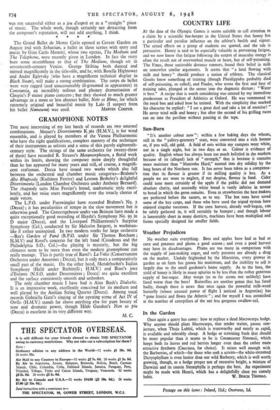COUNTRY LIFE
AT the date of the Olympic Games it seems suitable to call attention to a claim by a scientific bee-keeper in the United States that honey has a particular and peculiar influence on the athlete's health and vigour. The actual effects on a group of students are quoted, and the tale is persuasive. Honey is said to be especially valuable in preventing fatigue, and we now know that fatigue following the output of muscular energy is often the result not of overworked muscle or heart, but of self-poisoning. The Finns, those untireable distance runners, found their belief in milk on somewhat similar arguments. It seems that " a land flowing with milk and honey" should produce a nation of athletes. The classical Greeks knew something of training (though Pheidippides probably died of self-poisoning, so called), and Pindar, who wrote the first and best of training odes, plunged at the outset into the dogmatic dictum: "Water is best." A recipe that is worth considering was uttered by my immediate predecessor as President of Athletics at Oxford. He was summoned to the royal box and asked how he trained. With the simplicity that marked his character he replied: " I eat a great deal and take a lot of exercise! " He never tried milk and honey ; but after the second of his grilling races ran on into the pavilion without pausing at the tape.


































 Previous page
Previous page